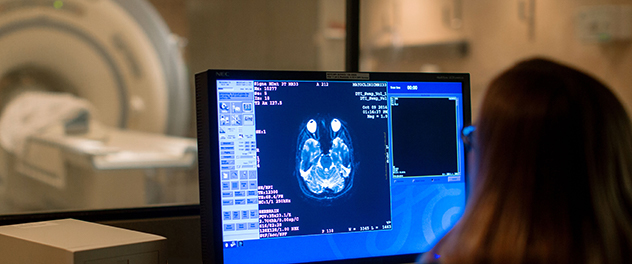 Unveiling the mysteries of Alzheimer's disease with magnetic resonance imaging
Unveiling the mysteries of Alzheimer's disease with magnetic resonance imaging
Mayo Clinic's Aging and Dementia Imaging Research Laboratory, led by Clifford R. Jack Jr., M.D., is working to better understand how to identify Alzheimer's disease and related dementias before symptoms surface.
Overview
The Aging and Dementia Imaging Research (ADIR) Laboratory is engaged in brain-imaging research in cognitive aging and Alzheimer's disease and related disorders. The lab uses imaging to study the biology of brain aging and cognitive impairment. The team also develops image-processing algorithms for quantitatively measuring the information obtained from brain imaging. The group is led by Clifford R. Jack Jr., (founder), Kejal Kantarci, M.D., and Prashanthi Vemuri, Ph.D.
The ADIR Lab's team studies what constitutes normal aging of the brain and how pathological aging and neurodegenerative diseases differ from typical aging. Specific goals include understanding how:
- Various imaging measures relate to neuropathology.
- Imaging relates to cognitive, behavior and specific phenotypic abnormalities cross-sectionally.
- Imaging relates to longitudinal change on cognition and behavior.
- Longitudinal change on imaging relates to simultaneous longitudinal change on cognition and behavior.
The lab's clinical imaging research is tightly integrated into the National Institutes of Health-funded longitudinal clinical and epidemiologic research projects in normal aging, Alzheimer's disease and other dementias through the Mayo Clinic Alzheimer's Disease Patient Registry and Alzheimer's Disease Research Center. The lab also collaborates with several investigators outside Mayo Clinic and serves as the imaging center for several large national multisite studies.
Affiliations
The Aging and Dementia Imaging Research Laboratory works closely with these Mayo Clinic research groups:
About Dr. Jack
Clifford R. Jack Jr., M.D., is the founder of the Aging and Dementia Imaging Research (ADIR) Laboratory. Dr. Jack is a diagnostic radiologist in the Department of Radiology and is a professor of radiology at Mayo Clinic College of Medicine and Science. His research interests include using imaging to identify pathological processes that occur in the living person prior to cognitive aging and dementia. His lab also seeks to help investigators develop treatments for these diseases before clinical symptoms occur. Dr. Jack also is focused on developing and validating tests for accurate diagnosis of Alzheimer's disease and related dementias and developing eventual interventions.
About Dr. Kantarci
Kejal Kantarci, M.D., is a career scientist in the Department of Radiology and is a professor of radiology at Mayo Clinic College of Medicine and Science. The goal of Dr. Kantarci's research program is to apply advanced imaging technology to detect the evolution of dementia pathologies before they cause irreversible damage to the brain. She aims to develop valid imaging tools to detect the earliest dementia-related changes in the brain, which could allow for early intervention and prevention of dementia, in particular Lewy body dementia. Dr. Kantarci also has ongoing projects using MRI and PET imaging to investigate the sex-specific dementia risk in women and how hormone therapies may modulate these risks.
About Dr. Vemuri
Prashanthi Vemuri, Ph.D., is a career scientist in the Department of Radiology and is a professor of radiology at Mayo Clinic College of Medicine and Science. Dr. Vemuri's work is focused on answering key mechanistic questions related to neurodegenerative and cerebrovascular diseases using advanced imaging, artificial intelligence and machine-learning technologies. Specifically, she and her team work on developing and validating imaging-based biomarkers to improve the understanding of vascular contributions to cognitive impairment and dementia (VCID) and Alzheimer's disease in older adults.
Dr. Vemuri and her team investigate the brain mechanisms of resistance — as some individuals do not develop Alzheimer's disease pathologies — and resilience, which focuses on how some individuals cope with Alzheimer's disease pathologies. Her group also explores protective factors causally promote better brain and cognitive health in the aging population through these brain mechanisms.